A recent survey highlights an alarming trend regarding hydration habits among American workers. Conducted by Talker Research and commissioned by Hint Water, the survey gathered responses from 2,000 employed individuals, revealing that over a third of Americans typically do not hydrate until after 3:00 p.m. on workdays. This delay raises concerns, especially since 87% of participants understand the importance of hydration for maintaining productivity and overall well-being.
Hydration Patterns and Generational Differences
The survey findings reveal significant generational differences in hydration habits. Among those surveyed, Gen Z emerged as the group most inclined to drink water first thing in the morning, with 54% starting their day with hydration. In stark contrast, Baby Boomers showed a preference for coffee, with 48% choosing it over water at the start of their day. On average, respondents reported consuming two cups of coffee during a typical workday, compared to only five glasses (40 ounces) of water.
Most participants believe they need to consume at least three glasses, or 24 ounces, of water by mid-morning to sustain productivity. However, the reality is striking; many fail to meet this hydration goal before late afternoon.
The Impact of Hydration on Well-Being and Work Productivity
The survey also examined broader workplace wellness contexts. Alarmingly, nearly one in five participants reported not taking any walks during their work hours, and 20% admitted to skipping breaks altogether. This lack of physical activity appears to correspond with frequent headaches, as 63% of respondents report suffering from them, attributing their discomfort to factors like emotional stress (49%), dehydration (41%), and fatigue (36%).
Despite ambitious to-do lists, many respondents indicated difficulty achieving their tasks, completing only about 65% of their intended objectives during working hours. Acknowledging the need to balance work commitments with health-related tasks, 54% of participants expressed feeling overwhelmed by how to integrate healthy habits into their busy schedules.
Barriers to Staying Hydrated
The study identified several barriers impeding proper hydration. Half of the respondents (50%) admitted that forgetfulness plays a significant role in their insufficient water intake, while 32% indicated disinterest in plain, unflavored water. Furthermore, 21% faced challenges accessing clean and quality water. This statistic highlights critical obstacles that some Americans face when it comes to staying hydrated.
In response to these challenges, many individuals have started to seek alternative strategies. Approximately 35% of respondents reported choosing flavored water as an appealing option, while 46% carry portable water bottles to encourage frequent hydration. Additionally, about 25% of participants expressed interest in experimenting with different water flavors, and 26% introduced additives to make their water consumption more enjoyable.
Recommended Hydration Practices
Although this survey indicates that respondents believe drinking seven glasses of water, or 56 ounces, daily is sufficient, public health recommendations from the National Academy of Medicine suggest that healthy adults should aim for upwards of 70 ounces of water each day. This gap underscores a pivotal need for better education surrounding hydration standards and the importance of adhering to these recommendations for overall health and wellness.
To effectively meet daily hydration demands, you can adopt simple practices that prioritize water intake:
- Create a Routine: Establish a daily routine that includes set times for drinking water, making it part of your schedule rather than an afterthought.
- Set Reminders: Utilize reminders on your phone or calendar to prompt you to drink water at regular intervals throughout the day.
- Keep Water Accessible: Place water bottles or pitchers at your workstation to ensure hydration is readily available.
- Explore Flavors: If plain water doesn’t appeal to you, consider adding fruits, herbs, or even flavored electrolyte mixes to enhance taste without added sugars.
Conclusion
The findings of this survey illuminate the pressing need for heightened awareness and proactive measures surrounding hydration in the workplace. The trend of delaying hydration poses significant implications not only for individual health but also for workplace productivity and overall employee satisfaction.
As American workers face increasingly demanding schedules, recognizing and addressing barriers to proper hydration can yield substantial benefits for personal well-being and professional performance. By incorporating regular water consumption into your daily routine, you lay the groundwork for healthier habits that can lead to heightened energy levels and enhanced productivity in both work and personal life.
The Healthy Habit: Practical Tips to Stay Hydrated
In addition to the strategies outlined, consider these actionable tips to further support your hydration goals:
- Carry a Water Bottle: Invest in a reusable water bottle that you’ll enjoy using. This encourages you to take it everywhere, maximizing your intake.
- Infused Water Ideas: Get creative with flavors! Try infusing your water with citrus fruits like lemon or lime, berries, or even cucumber and mint for a refreshing twist.
- Track Your Intake: Use apps or hydration tracking devices to help visualize your water consumption. Setting daily goals can provide motivation to keep you on track.
- Mind Your Diet: Foods can play a role in hydration as well. Incorporate more water-rich foods like cucumbers, tomatoes, oranges, and watermelons into your meals.
- Set Goals: Breaking down your hydration goals into smaller, achievable targets can make it feel less daunting. For instance, aim for one glass of water every hour.
- Pair with Breaks: Link your water intake with other daily activities. For instance, drink a glass each time you take a break from work or after completing a task.
- Consider Temperature: Some people prefer cold water, while others might favor it at room temperature. Find what works best for you to encourage greater consumption.
- Start Early: Begin your day with a glass of water as soon as you wake up. This kickstarts your hydration before you dive into the day’s tasks.
By intentionally making hydration a priority, you not only support your health but set a positive example for your colleagues and peers. Ultimately, fostering an environment in which hydration is valued can contribute to a more productive and positive workplace culture.
In conclusion, hydration is vital for overall health, and understanding the barriers and behavioral patterns highlighted in this survey can help you adopt more effective hydration habits. With some effort to prioritize water intake, you can improve not just your productivity, but also your well-being — leading to a healthier, more vibrant you.
Source: New York Post




